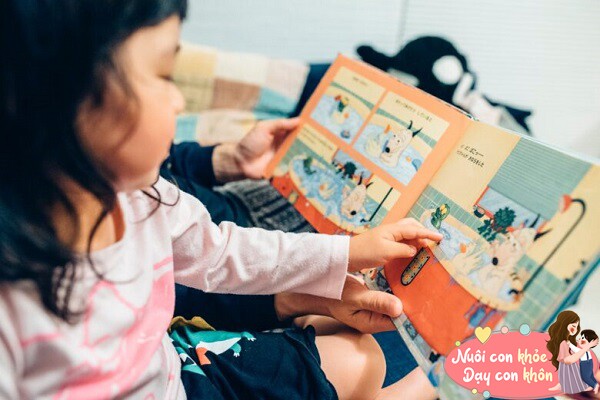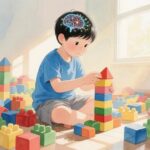Sleep plays a crucial role in a child’s brain development, encompassing a range of essential functions, from neuronal housekeeping to the formation of neural connections that facilitate learning and growth.
Research highlights significant differences in memory, emotional control, and concentration between children who get sufficient sleep and those who don’t.


Memory: The Unsung Hero of Knowledge Retention
Think of a child’s brain as a busy computer, constantly receiving and processing vast amounts of information throughout the day.
Sleep, especially deep sleep, acts like a nightly “maintenance routine,” organizing and storing this information. Insufficient sleep disrupts this process, leading to memory confusion or even forgetting.

Consider two children: Child A, who goes to bed early each night, can recall what their teacher explained the next day, while Child B, who stays up late, often struggles to remember the previous day’s lessons. Thus, sufficient sleep significantly enhances memory retention.
Additionally, sleep plays a pivotal role in strengthening neural connections in the brain. During sleep, especially the REM (Rapid Eye Movement) phase, the brain actively organizes and processes received information.
This enhances memory, creativity, and problem-solving abilities. Well-rested children can effortlessly connect ideas and information, fostering their cognitive development and decision-making accuracy.

Deep sleep acts like a nightly “maintenance routine,” organizing and storing information.

Emotional Control: Impacting Daily Moods
Sleep deprivation can also affect a child’s ability to regulate emotions. Children who don’t get enough sleep are more prone to mood swings, irritability, and frustration over minor issues.
This is because lack of sleep influences the region of the brain responsible for emotional management, specifically the amygdala, which plays a crucial role in processing and responding to emotions.
Well-rested children typically wake up in a cheerful mood, ready to tackle the day’s challenges with a positive attitude. They demonstrate better emotional regulation, effortlessly handling stressful situations without feeling overwhelmed.

Well-rested children typically wake up in a cheerful mood.
In contrast, sleep-deprived children tend to become restless, anxious, and struggle to remain calm when faced with minor daily life challenges.
Prolonged sleep deprivation can lead to more severe mental health consequences. Children are more susceptible to anxiety when they don’t get enough sleep. Without proper rest and recovery, their ability to process emotions and cope with stress diminishes.
Research also indicates that sleep-deprived children may struggle to establish and maintain relationships. Difficulty in emotional regulation can make them seem unapproachable and less sociable, leading to isolation and a sense of loneliness.

Focus: The Key to Effective Learning
Focus is essential for effective learning, and sleep plays a significant role in this regard. Well-rested children can maintain focus for longer periods in class and complete homework more efficiently and accurately.
On the other hand, sleep-deprived children struggle with concentration, hindering their learning effectiveness and causing them to feel exhausted while studying.
Consequently, we often observe that children who go to bed and wake up early demonstrate significantly higher efficiency in completing homework compared to those who stay up late.

Focus is key to effective learning.
Creating a Conducive Sleep Environment for Children
Now that we understand the significance of sleep for children’s brain development, what should parents do?
Firstly, establish a consistent sleep schedule to ensure your child gets enough sleep every night.
Secondly, create a peaceful and comfortable sleep environment, minimizing noise and light distractions.
Additionally, discourage the use of electronic devices before bedtime, as the blue light emitted by these devices can disrupt sleep quality.
Sleep is not just a period of rest; it is a vital process for brain development and learning. Therefore, parents should pay attention to sleep-related issues and help their children develop good sleep habits, laying a solid foundation for their academic pursuits and future life. Quality sleep is one of the keys to a child’s healthy development.
In summary, caring for a child’s sleep is not just a task but also an investment in their future. When children enjoy restful and sufficient sleep, they thrive physically and mentally, growing into confident and successful individuals.
“It’s Not About Weight or Height: 3 Signs Your Infant Is Thriving and Growing Smarter”
The development of a child’s brain is a fascinating process, and there are certain signs that indicate it is progressing well. One of the key indicators is the brain’s ability to efficiently analyze and process visual signals. This crucial function lays the foundation for a child’s overall cognitive development and their ability to interact with and understand the world around them.
The Smart Kid’s Trifecta: Engage, Explore, Excel
“Early childhood stimulation has a profound impact on a child’s brain development. Research suggests that with adequate stimulation, the efficiency of neural connections can increase by up to 40%. This highlights the critical role of a child’s environment and experiences in their cognitive growth and overall brain health.”




































